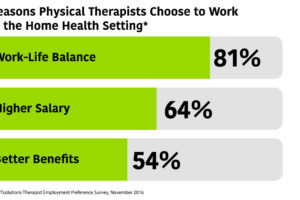When deciding where to work, Physical and Occupational Therapists and Assistants, as well as Speech Language Pathologists are blessed with multiple options from which to choose: Outpatient Clinics, Hospitals, Skilled Nursing Homes, Schools, Industrial Settings, Specialized Rehabilitation Hospitals, and Pediatric Clinics are just a few. In addition, Physical and Occupational Therapists and their Assistants, as well as Speech Language Pathologists get to choose whether they want to specialize with just one age group and setting, or become experienced in multiple settings and ages. In addition to deciding whether to generalize or specialize, therapists must determine whether to work in rural, suburban, or urban locations and as contingent or direct hire employees. In fact, a therapist has so many career options, they could “reinvent” their career every few years, just by moving to a different practice setting.
So, how do you know when it’s time to try something new? And what are the reasons why therapists choose to work in certain areas? In an effort to help answer some of these questions, myPTsolutions interviewed 477 physical therapists and found out what attracted them to their current setting. We also asked them if they had any advice for a therapist who might want to work in their current setting.
Here’s what experienced Home Health physical therapists had to say about finding a job and working in the the Home Care setting:
- “Look for a good company with constant guidance for skilled documentation and freedom to make clinical judgement without any pressure.”
- “Researching various options is important.”
- “Home care is an extremely flexible setting, but if you don’t want to help people then stay away from home care.”
- “Choose a company that shares your ethical and quality of care standards.”
- “Just love your job and be compassionate to every person you treat.”
- “Very good for life balance.”
- “Be flexible.”
- “Establish a good work-life balance and be open to challenges.”
- “Understand the dynamics of the setting itself and don’t just focus on patient treatment alone.”
- “I work in a home care setting. My advice for other therapists who might want to work in this setting is to be to be as professional as you can, respect your coworkers and your patients because you get all variety of patients in this setting. Also, to grow professionally you have to make a valiant effort by yourself.”
- “Look for a healthy environment with lots of growth and learning opportunities.”
- “Be flexible, but be on time!”
- “Be open to new opportunities.”
- “Always choose the work setting which holds your interest so you can work with your skills, putting heart in it.”
- “My practice field is home care visits because I get to be more patient focused.”
- “Go for quality rather quantity of your visits.”
- “(I do neuro rehab in the home setting) – Be willing to be flexible, think outside the box, and focus on the patient’s interests and goals.”
- “Interview with more than one company. Ask to be shown some actual documentation. Explore their documentation system. Ask to follow a therapist for a day before making any decisions. Tour the office and ask to meet some of the critical support staff. Ask how scheduling is done.”
- “Home care therapists must be good at time management and being open.”
- “Talking to other therapists that work within a setting can often give you the best information about what it is like to work in that setting or with a particular employer.”
- “Home care allows a therapist to use their clinical judgement and see how a patient works in their own setting.”
- “Sometimes what might have worked in subacute rehab doesn’t transition well to the patients home. Also, if you are a self motivated person, home care is a great setting because you set your own schedule with your patients.”
- “The flexible schedule works well, especially if you have a family.”
- “Home Health Therapists must like working with all kinds of people, be flexible and creative, and be able to organize their own schedule for greatest efficiency.”
- “Be open to looking at a setting/area of practice you may not have considered.”
- “I would not accept my position without many years of experience.”
- “Assess the territory you are expected to cover when working in home care setting.”
- “Be flexible during orientation.”
- “Learn about the setting, expectations, and goals the company has for you and compare these with your own personal goals.”
- “Ask questions….Get a lot of experience.”
- “Discuss job with current workers to understand their feelings of the company.”
- “Find a work life balance and find someone to hangout with.”
For more information about working as a home health therapist, check out this Spotlight on Home Health article, or watch our hot job video for a home health Travel PT job opening in Rhinelander, WI.
What about you?
If you have experience working as a physical therapist in the home health setting, what advice do you have for therapists who are considering this line of work? Please share your thoughts in the comments section below.
Do you have a specific question about this setting? Please share it with us in the comments section below, as well. Thanks!


